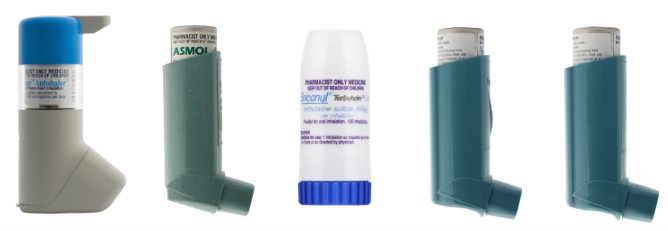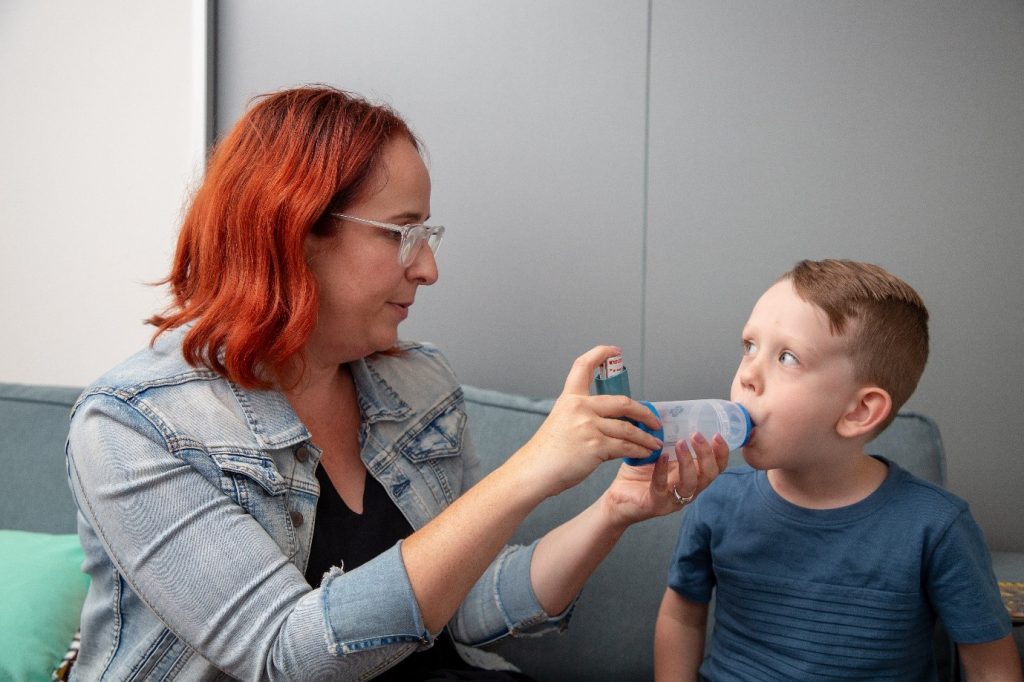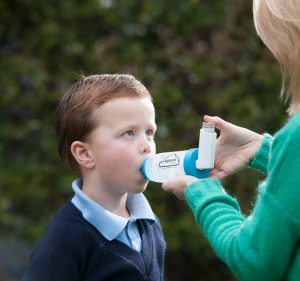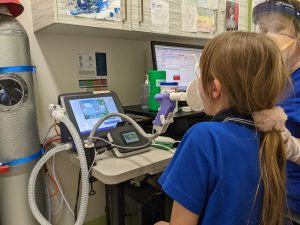Asthma can be hard to understand even as adults, so explaining it to kids can be especially challenging. But explaining asthma to your child in a way they can understand may help them feel more confident about managing it.
You’re doing a great job as a parent and we’re here to support you. If you have questions or need a sounding board, you can speak with us directly.
Book a call with an asthma educator
1. How asthma affects breathing
You have 2 lungs in your chest that are filled with lots of airways. The lungs job is to move air in and out of your body so you can breathe. People who have asthma have sensitive airways that can get all tight and swollen. This can make it hard for you to breathe and can make you cough or make a whistling sound. This makes your lungs unhappy and can make you unhappy too.
2. Teach them about their asthma triggers
There are lots of things that can start your asthma symptoms, which are called triggers. The more you know about them the better you can manage your asthma. Some things that might be an asthma trigger are running (playing sport), colds/flu’s, cold air, pollen, dust, smoke, flowers, grasses and dust mites
Read more on each trigger below
You can read more about asthma triggers here: https://asthma.org.au/winter-triggers-for-kids/
3. Explain an asthma attack
When your lungs and airways get unhappy with asthma, it can cause shortness of breath, coughing, a tight feeling in your chest or a wheezing sound. This is called an asthma flare-up. When a flare-up is really bad or happens really fast it might be called an asthma attack. If this happens it can feel scary and that’s okay. It is scary when you can’t breathe well, and you might not be able to talk without taking lots of breaths.
You can get through an asthma flare-up or asthma attack by knowing what to do.
Your doctor writes an Asthma Action Plan that has instructions on what asthma medicine to give you. You should make sure your parents, carers and everyone else who looks after you has a copy of this. This could include your teachers, sports coach or grandparents.
Your Asthma Action Plan will have your instructions for Asthma First Aid. Don’t worry, if you can’t find it, or don’t have an Asthma Action Plan yet, you can follow the basic Asthma First Aid steps here. Many of your teachers and carers may already know what to do.
4. Talk about their medication
Reliever:

When you are having trouble catching your breath, we have this one to help you feel better, quickly.
Most children will have a blue/grey ‘reliever’ puffer, this medicine is called ‘salbutamol’. Its job is to open your airways fast- it works in minutes! You use it when you have asthma symptoms and in Asthma First Aid. It is sometimes used before your exercise or sport. During a cold or asthma flare-up, your doctor might tell you to take it more often. It should last for about 4 hours.
It’s important to use your puffer with a spacer the right way. Small children 4 or under should also use a mask attached to their spacer.
Older children might use a different inhaler called a Turbuhaler (See video here)
 |
 |
Preventer:

Some children have a second puffer called a preventer. Often this is orange or red but there are lots of different colours it might be. It all depends on what your doctor thinks will work best for you. This medicine is a ‘corticosteroid’. Its job is to calm down your lungs, so they aren’t so sensitive to your triggers. The medicine makes the airways less red and swollen inside. It makes your lungs much happier.
You need to take this medicine every day to help your lungs cope with all the things that might irritate them. It takes around 2-4 weeks to work properly, so it’s not a good idea to skip it once you’re feeling better. Otherwise, the redness and sensitivity can come back.
Its really important you always use a spacer with your preventer puffer. This stops your mouth or throat from getting sore.
Older children might use a different inhaler called an Accuhaler, Ellipta or Turbuhaler. Sometimes your preventer might have two medicines in it if one didn’t work for you.
After you use your preventer, always rinse your mouth out and clean your teeth.
5. Doctors are our friends
Visiting the doctor is important so that they can check your asthma and make sure you have the right asthma medicines and plans in place.
Sometimes your doctor might want to listen to your chest with a stethoscope. It can feel cold when they put it on your back and chest but it helps them hear signs of asthma. Other times they might ask you to blow into a tube to test of your lungs or send you to a special clinic to do this test. They might ask you questions about when you get your asthma symptoms. This is all to help them know what your lungs need.
 |
 |
Your doctor also works with you and your parents/carers to write your Asthma Action Plan. Always follow your Asthma Action Plan that your doctor provides. It’s important you know what to do when your asthma starts. It’s also important the people around you know too so that they can all help you.
6. Why do I have asthma?
We can’t say for sure where your asthma came from. It could be one of these reasons or a different reason all together:
- If mum or dad has asthma, it tends to run in families
- Being around lots of air pollution or cigarette smoke from a young age
- Being around things you are allergic or sensitive to
At the moment there is no cure for asthma. Sometimes asthma can improve as children grow older, other times it stays the same or can even worsen. But luckily, science has helped make lots of very good medicines that can help you. Your parents or carers might have used something completely different if they had asthma when they were younger!
Maybe when you grow up you will be a doctor or scientist who finds a cure for asthma!
Note for Parents
You’re doing an amazing job as a parent or carer to be educating yourself and your child(ren) on their asthma, so they know what to do. You can Book a Call with our Asthma Support and Education Team if you have any questions about your child’s asthma management.





 1800 278 462
1800 278 462


